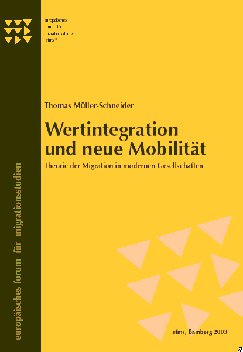
efms Publications: Separate volumes
Wertintegration und Mobilität.
Theorie der Migration in modernen Gesellschaften (Integration of values and mobility. Theory of migration in modern societies)Migration movements of people are an historical as well as current phenomenon. Nonetheless, the vast majority of people lives and dies close to the place where they were born. However, a new aspect is that migration has been continuously increasing since World War II to an ever greater extent and that many people today wish to migrate in order to find a better life in other societies. Another new aspect is that the idea of a "better life" has become more alike on global scale and that an ever growing number of people has access to worldwide means of communication and transport. This gives reason to the assumption that the extent of migration activities will keep growing in future. These assumptions, which originally have been formulated by Hoffmann-Nowotny, form the basis of the sociological theory of migration in modern societies which is presented by Thomas Müller-Schneider in this book. It aims particularly at explaining the increase of migration flows in modern societies.
|
|

Thomas Müller-Schneider: Wertintegration
und Mobilität. Theorie der Migration in
modernen Gesellschaften. efms, Bamberg 2003,
104 pages (in German), ISBN 3-927351-09-1, 18,- € (plus shipping and handling charge) |
Müller-Schneider's theory provides the theoretical framework for concrete research into migration issues. It is also a source of reference for people working on migration and integration issues in administration, politics and the media as it is written in a reader-friendly style. Here, it provides a better understanding of the underlying processes of migration. The theory provides a practice-relevant explanation of various types of migration and an analysis of potential measures to control them.
For orders through the efms, please send a fax to: 0049 - 951 - 93 20 20 20 or write us an e-mail to: efms
Contents (German):- Einleitung
- Verbreitete Erklärungsansätze weltweiter Migration
- Ökonomische Push-Pull-Modelle
- Wachsende Weltprobleme
- Illegale Migration und das Modell kommunizierender Röhren
- Grundlagen einer soziologischen Erklärung - Neue Zuwanderungswünsche und Migrationsmöglichkeiten
- Zur Entstehung der modernen westlichen Wohlstandswelt
- Globale Wertintegration und die Angleichung von Erwartungen
- Schrumpfende Welt
- Zunahme migrationsrelevanter Menschenrechte - Einschleusung
- Schwachstellen staatlicher Migrationsbarrieren
- Geschäft mit der illegalen Einreise
- Organisationsbildung
- Geschäftsbereiche im Zielland
- Bekämpfung des Menschenschmuggels - Asylmigration
- Zweckfremde Nutzung des Asyls
- Strategien im Asylverfahren
- Konstruktion und Vermittlung von Asyllegenden
- Verbleib abgelehnter Asylbewerber in westlichen Gesellschaften
- Dynamik der Asylmigration - Familiennachzug
- Öffnung der Nachzugstür
- Nutzung der Möglichkeiten
- Kettenmigration - Heiratsmigration von Frauen
- Vermittelter Tausch von Vorteilen
- Professionelle Heiratsvermittlung
- Private Heiratsvermittlung - Ein zusammenfassendes Modell
- Zur Steuerung der neuen Zuwanderung
- Effektivität der Maßnahmen gegen Menschenschmuggel
- Das asylpolitische Dilemma
- Alternative Handlungsoptionen - Literatur
|





